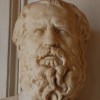Quotations about:
movement
Note not all quotations have been tagged, so Search may find additional quotes on this topic.
With waving opalescence in her gown,
Even when she walks along, you think she’s dancing.
Like those long snakes which charmers, while entrancing,
Wave with their wands, in cadence, up and down.[Avec ses vêtements ondoyants et nacrés,
Même quand elle marche on croirait qu’elle danse,
Comme ces longs serpents que les jongleurs sacrés
Au bout de leurs bâtons agitent en cadence.]Charles Baudelaire (1821-1867) French poet, essayist, art critic
Les Fleurs du Mal [The Flowers of Evil], Part 1, #28 “Avec ses vêtements ondoyants et nacrés,” st. 1 (1857) [tr. Campbell (1952)]
(Source)
(Source (French)). Alternate translations:
Robed in a silken robe that shines and shakes,
She seems to dance whenever she treads the sod,
Like the long serpent that a fakir makes
Dance to the waving cadence of a rod.
[tr. Sturm (1905)]
With pearly robes that wave within the wind,
Even when she walks, she seems to dance,
Like swaying serpents round those wands entwined
Which fakirs wave in rhythmic elegance.
[tr. Scott (1909)]
with all her undulant pearly draperies,
she moves in measures lovelier than a dance,
as in the fakirs' Indian sorceries
tall cobras 'neath a moving rod advance
[tr. Shanks (1931)]
With her pearly, undulating dresses,
Even when she's walking, she seems to be dancing
Like those long snakes which the holy fakirs
Set swaying in cadence on the end of their staffs.
[tr. Aggeler (1954)]
With her dresses undulating, pearly,
Even walking one would think her dancing,
Like those long serpents which holy charmers
Move in harmony at the tips of their batons.
[tr. Wagner (1974)]
Even when she walks she seems to dance!
Her garments writhe and glisten like long snakes
obedient to the rhythm of the wands
by which a fakir wakens them to grace.
[tr. Howard (1982)]
With her undulating, iridescent clothes, even when she walks you would think she is dancing, like those long snakes that sacred jugglers shake rhythmically on the ends of their sticks.
[tr. Clark (1995), #17]
She doesn’t walk; she rather dances through salons
Within her buoyant gowns of glittering, silver nacre,
Curling like the snake of a turbaned Hindu fakir,
Unrolled from in between his undulant batons.
[tr. Eriksson]
Even when she walks one would believe that she dances.
[Common rendering]
I hold it blasphemy to say that a man ought not to fight against authority: there is no great religion and no great freedom that has not done it, in the beginning.
George Eliot (1819-1880) English novelist [pseud. of Mary Ann Evans]
Felix Holt, the Radical, ch. 46 (1866)
(Source)
There are those in the industry who believe broadcasting can move men, and even some who believe it could move mountains, but they are outnumbered by those who believe all it has to do is move goods.
Alexander Kendrick (1910-1991) American journalist
Prime Time: The Life of Edward R. Murrow (1969)
(Source)
When a just cause reaches its flood-tide … whatever stands in the way must fall before its overwhelming power.
Carrie Chapman Catt (1859-1947) American women's suffrage activist
“Is Woman Suffrage Progressing?” speech, Sixth Convention of the International Woman Suffrage Alliance, Stockholm (13 Jun 1911)
(Source)
The art of leadership is a serious matter. One must not lag behind a movement, because to do so is to become isolated from the masses. But one must not rush ahead, for to rush ahead is to lose contact with the masses. He who wishes to lead a movement and at the same time keep touch with the vast masses, must conduct a fight on two fronts, against those who lag behind and against those who rush ahead.
Josef Stalin (1879-1953) Georgian revolutionary and Soviet dictator
Leninism, Vol. 2 (1926) [tr. Paul (1933)]
(Source)
Often elided, "He who wishes to lead a movement must conduct a fight on two fronts, against those who lag behind and against those who rush ahead."
The bearers of the myth of every decade seem to carry in their hands the ax and the spade to execute and inter the myth of the previous one.
Murray Kempton (1917-1997) American journalist.
Part of Our Time: Some Ruins & Monuments of the Thirties, Prelude (1955)
(Source)
There is also this: when we renounce the self and become part of a compact whole, we not only renounce personal advantage but are also rid of personal responsibility. There is no telling to what extremes of cruelty and ruthlessness a man will go when he is freed from the fears, hesitations, doubts and the vague stirrings of decency that go with individual judgement. When we lose our individual independence in the corporateness of a mass movement, we find a new freedom — freedom to hate, bully, lie, torture, murder and betray without shame and remorse. Herein undoubtedly lies part of the attractiveness of a mass movement.
Eric Hoffer (1902-1983) American writer, philosopher, longshoreman
True Believer: Thoughts on the Nature of Mass Movements, Part 3, ch. 14, § 77 (1951)
(Source)
The conflict between the principle of liberty and the fact of slavery is coming gradually to an issue. Slavery has now the power, and falls into convulsions at the approach of freedom. That the fall of slavery is predetermined in the counsels of Omnipotence I cannot doubt; it is a part of the great moral improvement in the condition of man, attested by all the records of history. But the conflict will be terrible, and the progress of improvement perhaps retrograde before its final progress to consummation.
What the tender poetic youth dreams, and prays, and paints to-day, but shuns the ridicule of saying aloud, shall presently be the resolutions of public bodies, then shall be carried as grievance and bill of rights through conflict and war, and then shall be triumphant law and establishment for a hundred years, until it gives place, in turn, to new prayers and pictures.
Ralph Waldo Emerson (1803-1882) American essayist, lecturer, poet
“Politics,” Essays: Second Series (1844)
(Source)
This quotation is more often given as the paraphrase used by another speaker of the era, the abolitionist Wendell Phillips:
What the tender and poetic youth dreams to-day, and conjures up with inarticulate speech, is to-morrow the vociferated result of public opinion, and the day after is the charter of nations.
Phillips used this phrase, prefixed with, "As Emerson says," and in quotation marks, at least twice. First in his lecture "Harper's Ferry" (1 Nov 1859), Brooklyn. Second, in a different context, in "The Scholar in a Republic" (30 Jun 1881), a famous speech at the centennial of the Phi Beta Kappa society at Harvard University.
Emerson did not use this shorter phrasing, however, in any of his written works, and frequent attributions of it to him are in error.
Get action. Seize the moment. Man was never intended to become an oyster.
Theodore Roosevelt (1858-1919) American politician, statesman, conservationist, writer, US President (1901-1909)
Comment to Mrs. J. A. Roosevelt (25 Dec 1851)
(Source)
Quoted in David McCullough, Mornings on Horseback (1981), sourced from the W. Sheffield Cowles, Jr. Collection (private). Usually given as a quote in full to his children, McCullough only notes the last sentence ("Man ... oyster") as an actual quotation.
Not the cry, but the flight of a wild duck, leads the flock to fly and follow.
(Other Authors and Sources)
Chinese proverb
First recorded by Jean Paul [Johann Paul Friedrich Richter] (1763-1825), Levana, sec. 8 (1807): "Nicht das Geschrei, sagt ein chinesischer Autor, sondern der Ausflug einer wilden Ente treibt die Heerde zur Folge und zum Nachfliegen." (See H. A., A Book of Thoughts (1865))
Once you begin to take yourself seriously as a leader or as a follower, as a modern or as a conservative, then you become a self-conscious, biting, and scratching little animal whose work is not of the slightest value or importance to anybody.
Rebels and dissidents challenge the complacent belief in a just world, and, as the theory would predict, they are usually denigrated for their efforts. While they are alive, they may be called “cantankerous,” “crazy,” “hysterical,” “uppity,” or “duped.” Dead, some of them become saints and heroes, the sterling characters of history. It’s a matter of proportion. One angry rebel is crazy, three is a conspiracy, fifty is a movement.
The animosities of sovereigns are temporary, and may be allayed; but those which seize the whole body of people, and of a people too, dictate their own measures, produce calamities of long duration.
Thomas Jefferson (1743-1826) American political philosopher, polymath, statesman, US President (1801-09)
Letter to C. W. F. Dumas (6 May 1786)
(Source)
Some find activity only in repose, and others repose only in movement.
[Les uns ne peuvent trouver d’activité que dans le repos, el les autres de repos que dans le mouvement.]
Joseph Joubert (1754-1824) French moralist, philosopher, essayist, poet
Pensées [Thoughts], ch. 4 “De la Nature des Esprits [On the Nature of Minds]” ¶ 19 (1850 ed.) [tr. Calvert (1866)]
(Source)
(Source (French)). Alternate translation:
There are some who can only find activity in repose, and others who can only find repose in movement.
[tr. Lyttelton (1899), ch. 2, ¶ 11]
Mass movements can rise and spread without belief in a God, but never without belief in a devil.
Eric Hoffer (1902-1983) American writer, philosopher, longshoreman
True Believer: Thoughts on the Nature of Mass Movements, Part 3, ch. 15, § 65 (1951)
(Source)
Up to now, America has not been a good milieu for the rise of a mass movement. What starts out here as a mass movement ends up as a racket, a cult, or a corporation. Unlike those anywhere else, the masses in America have never despaired of the present and are not willing to sacrifice it for a new life and a new world.
Eric Hoffer (1902-1983) American writer, philosopher, longshoreman
“The Negro Revolution,” The Temper of Our Time (1967)
(Source)
Frequently misquoted as "Every great cause begins as a movement, becomes a business, and eventually degenerates into a racket."
Originally published in the New York Times Magazine (1964-11-29).
The world can only be grasped by action, not by contemplation. The hand is more important than the eye. We are active; and indeed we know, as something more than a symbolic accident in the evolution of man, that it is the hand that drives the subsequent evolution of the brain. We find tools today made by man before he became man. Benjamin Franklin in 1778 called man “a tool-making animal,” and that is right.
All things are in motion, and nothing is at rest. … You cannot step into the same [river] twice, for fresh waters are ever flowing in upon you.
[Πάντα ῥεῖ καὶ οὐδὲν μένει]
Heraclitus of Ephesus (c.540-c.480 BC) Greek philosopher [Ἡράκλειτος, Herákleitos, Heracleitus]
(Attributed)
Paraphrased by Socrates in Plato, Cratylus, l. 402 [tr. B Jowett (1894)] and by Diogenes Laërtius in Lives of the Philosophers Bk 9, sec 8
Alt trans.:
- Everything flows, nothing stays still
- Everything flows and nothing stays.
- Everything flows and nothing abides.
- Everything gives way and nothing stays fixed.
- Everything flows; nothing remains.
- All is flux, nothing is stationary.
- All is flux, nothing stays still.
- You cannot step twice into the same river; for other waters are continually flowing in.
- You cannot step twice into the same stream. For as you are stepping in, other waters are ever flowing on to you.
- You cannot step twice into the same river.
- It is impossible to step into the same river twice.
- No man ever steps in the same river twice, for it's not the same river and he's not the same man.
Most of the members of the convent were old-fashioned Satanists, like their parents and grandparents before them. They’d been brought up to it and weren’t, when you got right down to it, particularly evil. Human beings mostly aren’t. They just get carried away by new ideas, like dressing up in jackboots and shooting people, or dressing up in white sheets and lynching people, or dressing up in tie-dye jeans and playing guitars at people. Offer people a new creed with a costume and their hearts and minds will follow.
Terry Pratchett (1948-2015) English author
Good Omens, 2. “Eleven Years Ago” (1990) [with Neil Gaiman]
(Source)
All movements go too far.
Bertrand Russell (1872-1970) English mathematician and philosopher
“On Being Modern-Minded,” The Nation (1937-01-09)
(Source)
No snowflake in an avalanche ever feels responsible.
[Żaden płatek śniegu nie czuje się odpowiedzialny za lawinę.]
Stanislaw Lec (1909-1966) Polish aphorist, poet, satirist
More Unkempt Thoughts [Myśli nieuczesane nowe] (1964) [tr. Gałązka (1969)]
(Source)
Alternate translation: "Each snowflake in an avalanche pleads not guilty."
More discussion of this quotation here: No Snowflake in an Avalanche Ever Feels Responsible – Quote Investigator.
All change is not growth; all movement is not forward.
Ellen Glasgow (1874-1945) American author
In Clifton Fadiman, I Believe: The Personal Philosophies of Certain Eminent Men and Women of Our Time (1939 ed.)
(Source)
I find the great thing in this world is not so much where we stand, as in what direction we are moving: To reach the port of heaven, we must sail sometimes with the wind and sometimes against it, — but we must sail, and not drift, nor lie at anchor.



























